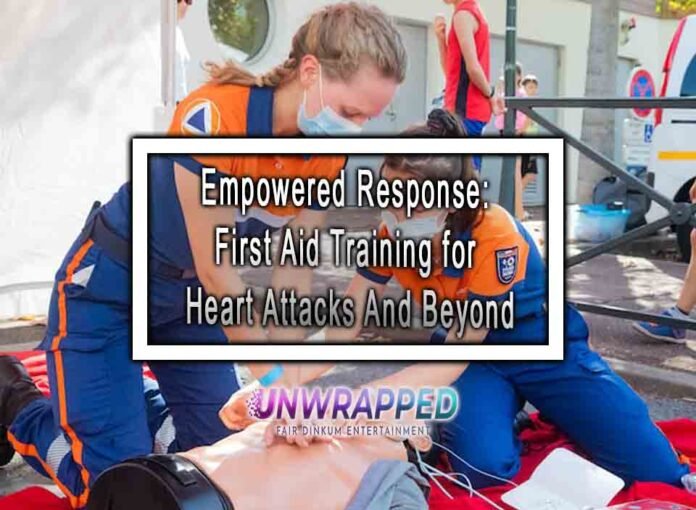A heart attack is a frightening and potentially life-threatening event that requires immediate attention. While prevention is key, knowing how to respond is crucial if you or someone around you experiences a heart attack. In this article, we’ll discuss the fundamentals of responding to such an emergency and highlight the value of first aid training in preventing serious injury and death.
Understanding A Heart Attack
Before delving into the steps to take during a heart attack, it’s essential to have a basic understanding of what occurs during this medical emergency. A heart attack, also known as a myocardial infarction, occurs when a blood clot prevents the flow of blood to the heart muscle. If not treated promptly, this blockage deprives the heart of oxygen and can result in serious injury or even death.
Recognizing The Signs And Symptoms
Recognizing the symptoms of a heart attack is critical for timely treatment. Some examples of common indicators are:
- Chest pain or discomfort: This may feel like pressure, tightness, squeezing, or aching in the chest that may radiate to the arms, neck, jaw, or back.
- Shortness of breath: Breathing problems or feeling out of breath, particularly when coupled with chest pain.
- Nausea, lightheadedness, or cold sweats: These symptoms may accompany chest pain or occur independently.
The Immediate Response
The following actions can greatly improve the chances of a successful outcome if you or a close relative has heart attack symptoms:
- Call emergency services immediately: Dial the emergency number for your location (e.g., 000 in Australia) and provide them with accurate information about the situation.
- Stay calm and reassure the affected person: Anxiety can worsen the situation, so try to remain composed and reassure the person experiencing the heart attack.
- Assist with prescribed medication: If the person has been prescribed nitroglycerin, help them take it as directed.
Administering First Aid Techniques
- CPR (Cardiopulmonary Resuscitation): If the person becomes unresponsive and stops breathing, perform CPR by giving chest compressions and rescue breaths until medical professionals arrive.
- Use an automated external defibrillator (AED): If an AED is available, follow its instructions correctly. AEDs can help restore the heart’s normal rhythm.
- Monitor vital signs: Regularly check the person’s breathing and pulse, and be prepared to perform CPR if necessary.
When enrolling in a first aid course, people get the self-assurance and preparedness to deal with situations. If you live in or around Townsville and are considering getting your first aid certification, you may stop looking now. The first aid course on CPR provided by FirstAid Pro in Townsville is a convenient option.
The Role Of First Aid Training
First aid training equips individuals with the skills and knowledge necessary to respond effectively during a heart attack or any other medical emergency. By undergoing first aid training, you can gain confidence to provide immediate assistance, potentially saving lives in critical situations.
The Importance Of Prevention
While knowing how to respond to a heart attack is vital, prevention remains paramount. Adopting a heart-healthy lifestyle that includes regular physical activity, eating well, stress management, and giving up tobacco may minimize the risk of heart disease and heart attacks.
Conclusion
Experiencing a heart attack can be a terrifying ordeal, but being prepared and having the right knowledge can make a life-saving difference. The odds of a happy outcome can be considerably increased if you can recognize the signs and symptoms, act quickly, and apply the strategies you learnt in first aid training.
If you reside in or near Toowoomba and want to invest in first aid training, which equips you with the necessary knowledge and skills to handle medical emergencies and improve the well-being of your community, then there is no need to search any further. Enrolling promptly in a first aid course Toowoomba is essential to guarantee a timely and beneficial outcome.
However, prevention should always be a priority, and taking proactive steps to maintain heart health is crucial. With the power of knowledge and preparedness, we can protect ourselves and those around us, turning a potential tragedy into an opportunity to save lives.









